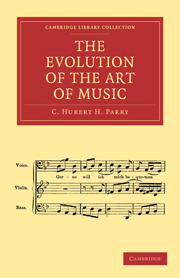Book contents
- Frontmatter
- PREFACE
- Contents
- CHAPTER I PRELIMINARIES
- CHAPTER II SCALES
- CHAPTER III FOLK-MUSIC
- CHAPTER IV INCIPIENT HARMONY
- CHAPTER V THE ERA OF PURE CHORAL MUSIC
- CHAPTER VI THE RISE OF SECULAR MUSIC
- CHAPTER VII COMBINATION OF OLD METHODS AND NEW PRINCIPLES
- CHAPTER VIII CLIMAX OF EARLY INSTRUMENTAL MUSIC
- CHAPTER IX BEGINNINGS OF MODERN INSTRUMENTAL MUSIC
- CHAPTER X THE MIDDLE STAGE OF MODERN OPERA
- CHAPTER XI THE MIDDLE STAGE OF “SONATA” FORM
- CHAPTER XII BALANCE OF EXPRESSION AND DESIGN
- CHAPTER XIII MODERN TENDENCIES
- CHAPTER XIV MODERN PHASES OF OPERA
- SUMMARY AND CONCLUSION
- INDEX
CHAPTER XIV - MODERN PHASES OF OPERA
Published online by Cambridge University Press: 29 August 2010
- Frontmatter
- PREFACE
- Contents
- CHAPTER I PRELIMINARIES
- CHAPTER II SCALES
- CHAPTER III FOLK-MUSIC
- CHAPTER IV INCIPIENT HARMONY
- CHAPTER V THE ERA OF PURE CHORAL MUSIC
- CHAPTER VI THE RISE OF SECULAR MUSIC
- CHAPTER VII COMBINATION OF OLD METHODS AND NEW PRINCIPLES
- CHAPTER VIII CLIMAX OF EARLY INSTRUMENTAL MUSIC
- CHAPTER IX BEGINNINGS OF MODERN INSTRUMENTAL MUSIC
- CHAPTER X THE MIDDLE STAGE OF MODERN OPERA
- CHAPTER XI THE MIDDLE STAGE OF “SONATA” FORM
- CHAPTER XII BALANCE OF EXPRESSION AND DESIGN
- CHAPTER XIII MODERN TENDENCIES
- CHAPTER XIV MODERN PHASES OF OPERA
- SUMMARY AND CONCLUSION
- INDEX
Summary
Gluck's theories of reform had strangely little effect upon the course of opera for a long while. The resources of art were not sufficiently developed to make them fully practicable, and even if they had been, it is quite clear that in many quarters they would not have been adopted. The problem to be solved in fitting intelligible music to intelligible drama is one of the most complicated and delicate ever undertaken by man; and the solution is made all the more difficult through the fact that the kind of public who frequent operas do not in the least care to have it solved. Operatic audiences have always had the lowest standard of taste of any section of human beings calling themselves musical. They generally have a gross appetite for anything, so long as it is not intrinsically good. If the music is good they have to be forced to accept it by various forms of persuasion; and a composer who attempts any kind of artistic thoroughness has to look forward either to failure, or to the disagreeable task of insisting on being heard. It follows that progress towards any ideal assimilation of the various factors of operatic effect has to be achieved in spite of the taste of the audiences, and by the will and determination which is the outcome of a composer's conviction.
- Type
- Chapter
- Information
- The Evolution of the Art of Music , pp. 306 - 332Publisher: Cambridge University PressPrint publication year: 2009First published in: 1896



